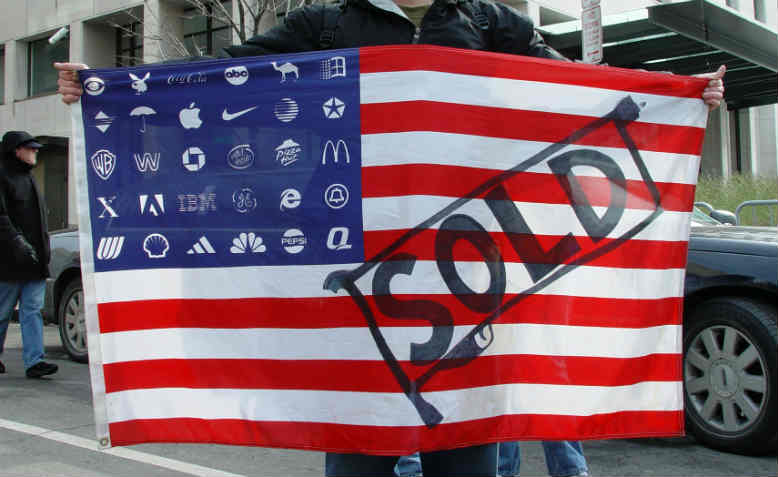 Protestor in Washington. Photo: Wikimedia Commons
Protestor in Washington. Photo: Wikimedia Commons
As market fundamentalism is falling out of favour, especially among the young, socialist ideas are gaining traction, writes Des Freedman
A spectre is haunting the US, and conservatives are worried. A new study from the admirably impartially named Victims of Communism Memorial Fund has found that 50% of US millennials would prefer to live in a communist or socialist system, significantly more than the 42% who opted to continue living under capitalism. ‘Millennials’, ran a Fox News headline, ‘think that socialism would create a great safe space.’
Disturbingly also for the organization that commissioned the poll, Karl Marx attracts a 31% favorability rating from millennials while Lenin, the architect of the Russian Revolution whose 100th anniversary takes place this week, attracts a very respectable 23% rating. This is higher than the approval rating of millennials for the US President himself – a recent poll carried out by NBC put this figure at 21%. At least Trump is more highly regarded than Stalin who earns a mere 6% approval although the much higher ratings for Lenin than for Stalin must drive the people at Fox crazy given their penchant for throwing Marx, Lenin and Stalin into the same category of tyrants and fanatics.
Fox is especially troubled by the findings that reveal that a significant minority of Americans don’t share its fundamentalist attitude towards the First Amendment. Some 43% of millennials and 42% of all Americans think that there should be restrictions on freedom of expression in order to prevent ‘offensive speech’. Rather than seeing this as evidence, as does Fox, of a knee-jerk political correctness, it is rather a welcome rejection of a corporation-friendly interpretation of the First Amendment and a sign that Americans are seeking to protect vulnerable groups from harm.
Now you might think that this is just another bogus opinion poll or agree with the French theorist Pierre Bourdieu who argued that because of its constructed nature, ‘public opinion does not exist’. But the poll was carried out by the generally well-regarded pollsters YouGov and, more significantly, chimes with two other polls carried out in the US in the last eighteen months both of which contained similar conclusions. Gallup reported that people aged between 18 and 29 were equally sympathetic towards capitalism and socialism while Harvard’s Institute of Politics found that a majority of under-30s were hostile, rather than sympathetic, to capitalism even if the numbers supporting socialism were not quite at the same level of those backing capitalism.
How can we explain these shocking trends that, in the words of the very frustrated director of the Victims of Communism Memorial Foundation, show that ‘millennials are increasingly turning away from capitalism and toward socialism and even communism as a viable alternative’?
To be honest, given the current prospects for millennials and post-millennials, it’s a miracle that the support for capitalism is holding up at all.
Student debt, something that their predecessors barely had to confront, now stands at $1. 4 trillion with the average millennial owing around $30,000. This is a generation that is increasingly priced out of affordable housing and is facing a slump in wages, the lowest since 1980. According to the New York Times, millennials ‘are faced with a slow economy, high unemployment, stagnant wages and student loans that constrict their ability both to maintain a reasonable lifestyle and to save for the future.’ And yet they still have the audacity to reject capitalism and to consider alternatives.
Not surprisingly, they are also the generation most likely to express dissatisfaction with the electoral system and turned to Bernie Sanders in the 2016 presidential election in huge numbers with 56% having a positive view of Sanders as compared to only 38% for Clinton and 22% for Donald Trump.
Millennials aren’t alone, however, in having real doubts about the fairness of US society. The YouGov poll shows that ‘concerns about inequality are prevalent’ across the board. While 53% of millennials believe that the US economic system ‘works against me’, 48% of all Americans believe this to be true. Less than one-third of those polled think that the rich pay enough tax while nearly half want to see higher taxes for the rich with 37% arguing for a ‘complete change to our economic system’.
The conditions are ripe, therefore, for the sympathy to be turned into concrete support for socialist ideas. Naturally this will require the development of popular socialist organisations, a phenomena which – despite the bump provided by the horror of the Trump presidency – is taking place painfully slowly. The biggest socialist organization, Democratic Socialists of America, has some 30,000 members while the Sanders campaign has fragmented into different constitutive parts of the Democrats.
The message is clear, however, that socialist ideas are gaining traction as market fundamentalism has burnt its bridges especially with the young.
Millennials (and everyone else): you increasingly have nothing to lose but your debt. And a world to win.

